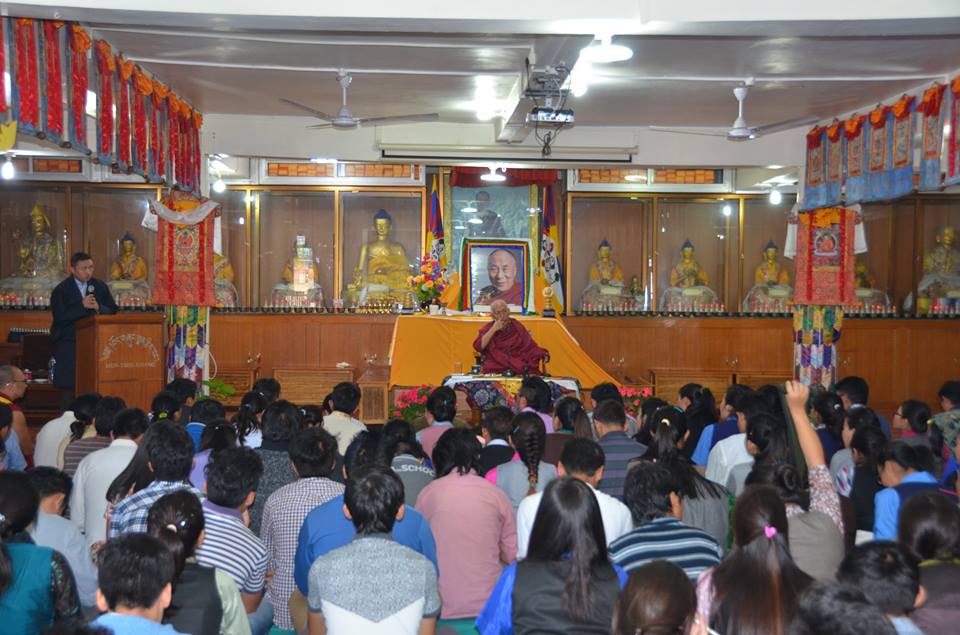Commentarial lecture at Tibetan Medical and Astrological Institute
At the request of Men-tsee-khangTibetan Medical and Astro Institute, Dharamshala, on the morning of 7 October 2016 His Eminence Prof. Samdhong Rinpoche gave a commentarial lecture on the text “Advice of Khache Phalu,” in the hall of the institute, to the teachers, students, staff members, and others.
After an introduction by Astrology Teacher, there followed the commentarial lecture by His Eminence Prof. Samdhong Rinpoche. His Eminence remarked of having heard about “Advice of Khache Phalu” when staying at monastic seat in Tibet, and that in everyday Tibetan society at that time people would quote many of the lines from the Advice, such as, the onomatopoeic “If the oblong and oblong tongue is not managed,/ Tragedy may befall on the round and round head.//”Rinpoche observed that this way of interspersing sayings in daily conversation have now almost ceased in the exile society.
Pointing out that the Advice is categorised under “Common worldly system” (mundane system) in the sDe-dge edition of Tangyur (bstan-ḥgyur; classical Buddhist commentarial texts translated into Tibetan), Rinpoche commented:
One human attribute distinct from animals is the intellect to differentiate between good and evil. In ancient Indian tradition there was the mention of the four wishes of a capable person: aspiration and wealth for this life, and spirituality and liberation for next lives. Of the means for achieving the four, spiritual teachings are for attaining liberation, and the guidance for achieving this life’s interests are called “treatises (texts) of worldly system.” In “Advice of Khache Phalu” there is a little of guidance on spirituality, but most part of the text describes the ways of going about with this life’s activities; as such, it is a text on themundane system.
Prior to Buddha’s time there were texts on mundane system (of conduct, administration, etc.), and subsequently the texts on mundane system written by Buddhist teachers were as well translated into Tibetan; they comprise of the texts: Nagarjuna’s Hundred Verses on Wisdom (Prajñāśataka), The Drop Reviving the People, Wisdom Lamp Wick, An Epistle to a Friend, Precious Garland; Mahapandita Ravigupta’s Verse Treasury; Acharya Vararuci’s A Hundred Verses;Jewel Garland—Rejoinder to questions of Vimala; etc.; king Chanakya’s text on mundane system, which is widely known in India to this day, had been as well translated into Tibetan.
Treasury of Jewels (known popularly as Well-spokenAdvice ofSakya [Pachen]), written by Sakya Panchen, was the first indigenous Tibetan work on the subject. There followed Well-spoken [Advice of] Gedhen, written by Panchen Sonam Drakpa, His Holiness the Fifth Dalai Lama’s Pearl Garland; later on, Ju-Mipham wrote The Ornament for Managing the Land, a text on mundane system, which was sourced in Sūtra of the Ten Wheels, Sūtra Requested by Nagarājāsagara, etc.
His Eminence Prof. Samdhong Rinpoche advised that if one looked into those texts one would know the framework of the treatises on mundane system.
Thereafter Rinpoche commented: Sakya Panchen’s words “If examined by reasoning, spirituality and the [mundane] system do not contradict./” and Khache Phalu’s “Spirituality and the mundane are separate, separate/” are dissimilar in thought. For Sakya Panchen it is feasible for the integration of two: spiritual and mundane; according to Khache Phalu that would seem not possible. In general, Rinpoche observed with analysis that it would be good if described as presence of both spirituality andmundane [system].
Advice of Khache Phalu was, Rinpoche remarked, repudiated to have been written by one of the Muslim residents of Lhasa, yet there is nothing clear about who wrote it. In the text there are mentions of “Khuda” of Islam, “master of actions,” the Buddhist term “the three Jewels.”
In giving a commentary on Advice of Khache Phalu in general, His Eminence Rinpoche touched upon the theme of the opening chapters: the preliminary; entreaty to spirituality; death and impermanence; running a kingdom; need for contentment; need for secrecy, in confidential matters, and of few words; need for decency and ethical behaviour; humility and knowing the limits; moderation in eating; self-reliance; relationship between father and son, between mother and daughter; need for repaying parents’ kindness.
After extensively commenting up to the third chapter, His Eminence Rinpoche answered questions from the students.
At the end the Principal of the Institute gave a speech of Thanks, followed by the Institute presenting a memento in gratitude to Rinpoche.

